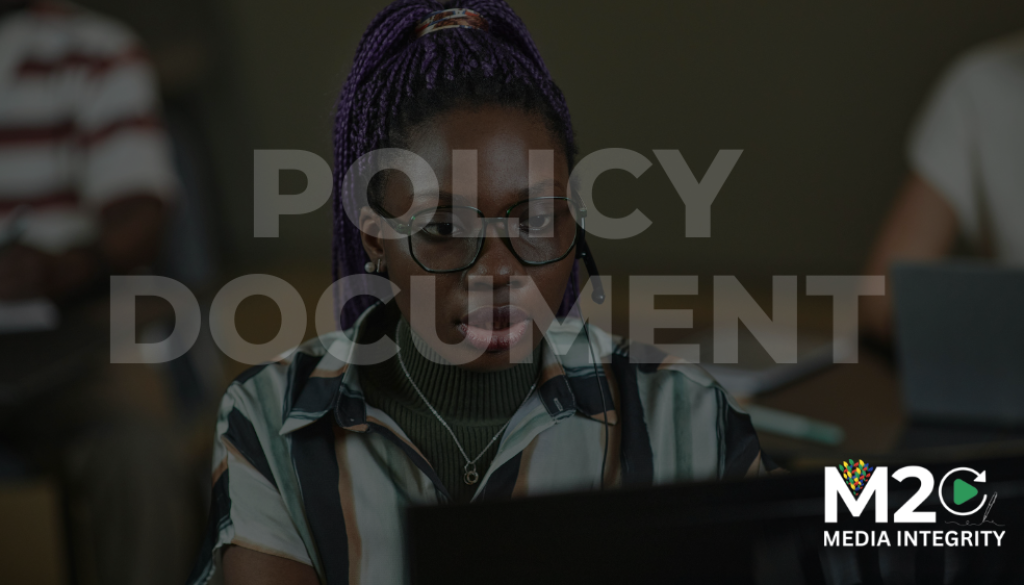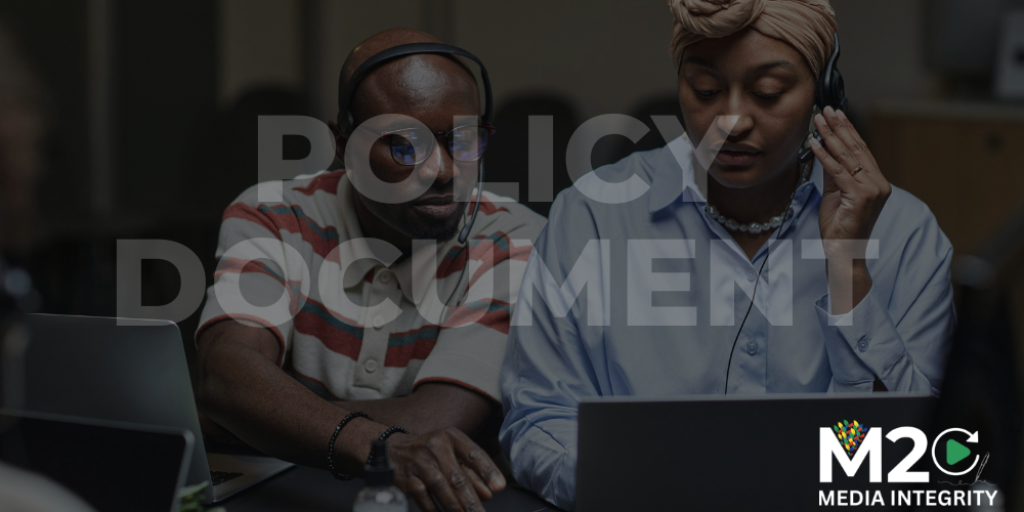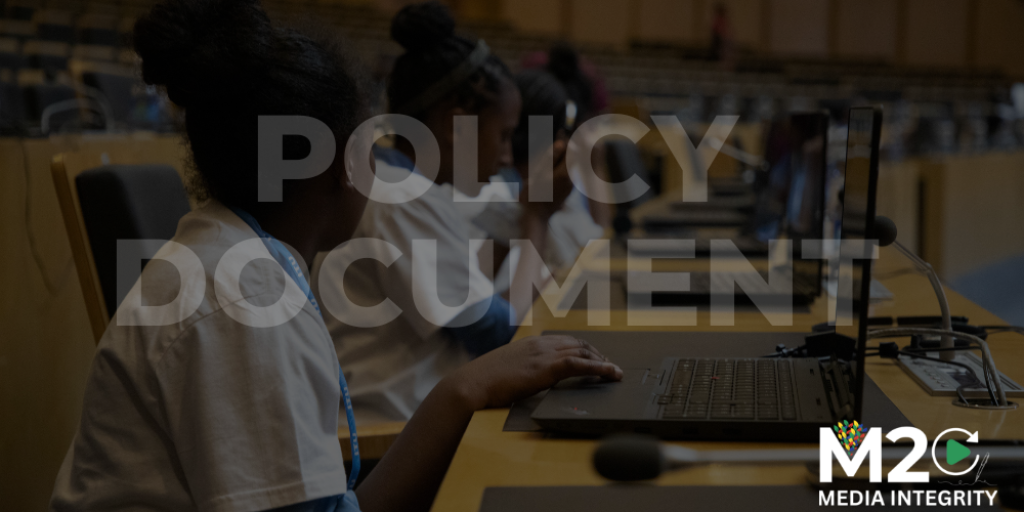M20 Policy Brief 5: Children’s rights should not be sidelined in the digital environment
Download the PDF here.
Overview
Children across the globe are increasingly coming to terms with and engaging in a digital world marked by both extraordinary promise and deep inequality. While the digital environment offers unprecedented opportunities for learning, expression, and civic engagement, many children remain disconnected, misrepresented, unprotected and at risk of being misinformed. The urgency of centering young voices in media integrity discussions is underscored by the 2024 Children in G20 findings, which reveal that 2.2 billion children and youth globally lack home internet access, while those who are connected face significant rights violations including commercial exploitation, relentless data harvesting, behavioral profiling for advertising, and inadequate protection standards. The African child’s experience in the digital environment is uniquely shaped by a complex interplay of opportunity and adversity. Africa is home to the world’s youngest population, with children and youth making up a significant proportion of its demographic landscape. The G20, as a global leader in digital governance, has a critical role to play in setting standards and fostering international cooperation that puts children’s rights at the centre of the digital future. This policy brief builds on G20 commitments to strengthen child and youth protection and participation in digital media.
Proposal to the G20
The G20 must recognise that building sustainable, inclusive and rights-respecting digital communities means ensuring children are protected and empowered online. As digital platforms continue to evolve rapidly, children in Africa, and globally, face urgent threats including unsafe online spaces, AI-driven surveillance and profiling of children, to deepfake technologies targeting minors, commercial exploitation of data, the digital divide and the explosion of mis and disinformation, all while being excluded from shaping digital policies. The G20 cannot afford to sideline children’s experiences, rights and best interest; they must be central to the global digital transformation agenda and uphold core protection principles of non-discrimination, protection, survival and development.
Defining the critical issue and role of the G20
The G20’s commitment to child online protection is not new. The 2021 High Level Principles for Children Protection and Empowerment in the Digital Environment developed a framework that promotes governments’ adoption of measures that provide for age-appropriate child safety by design, and which G20 members have been working to implement. Previous G20 efforts, documented through comprehensive toolkits, together with G20 member states efforts (in the form of consultations with children in the 2024 edition of Children in the G20 by the Brazilian articulation group, have identified critical success factors in the discussion on children’s digital rights, including holding tech companies accountable, age-appropriate design, risk response assessment and mitigation, effective support systems, and the essential role of states, civil society and business in safeguarding children online. This policy brief builds on those efforts.
The United Nations Convention on the Rights of the Child (UNCRC) General Comment 25 clarifies state obligations to extend offline rights protections to online spaces and requires tech companies to respect children’s rights. Within the African context, the African Union’s Child Online Safety and Empowerment Policy provides a continental framework recognising that children face exposure to hate speech, inappropriate content, and online predators while acknowledging digital technologies’ transformative potential for education and development. Together, these frameworks establish that protecting children online requires both regulatory oversight and corporate responsibility.
Five interconnected themes that the G20 must address:
1. Children in the Media (access to & consumption of news and information integrity)
Media policy must adapt by supporting digital participation, inclusive content, and youth-driven storytelling to reflect their lived realities and strengthen their media literacy. This is also very true for African children, who increasingly access news and information through social media, search platforms, and streaming services. As young minds increasingly turn to smartphones and tablets, they encounter a terrain riddled with algorithmic sinkholes, colonial data traps, and disinformation mirages. This is not merely an access gap; it is an integrity emergency, threatening an entire generation’s right to truth. At the click of a button, they are exposed to an overwhelming volume of content, ranging from political developments and community news to the latest celebrity trends. Online platforms prioritise content based on algorithms, likes, shares, and trending topics, rather than principles of fair representation and inclusivity. Algorithms and AI systems merge news and entertainment and blur the lines between fact and opinion, making it difficult for children to discern the importance of hard news. Emotionally charged and sensational content dominates their feeds. Less sensationalised but equally important content, which affects children’s lives and needs are often being ignored in favour of clickbait content. Furthermore, these algorithms quickly create echo chambers, reinforcing children’s preferences by serving them more of the same type of content.
2. Media and Information Literacy
As digital technologies reshape communication, education, and public engagement, Media and Information Literacy (MIL) has become a vital 21st-century skill. MIL empowers individuals, including children, to critically assess content, navigate media systems, identify disinformation, and participate meaningfully in public discourse. Children’s exposure to harmful digital experiences translates to violent content, mis and disinformation, cyberbullying, online grooming and child sexual abuse material (CSAM) which have detrimental effects on children’s mental health and development.
Climate disinformation, as discussed in MMA’s discussion document, deserves special mention because it undermines children’s ability to understand environmental issues and make informed decisions about climate action, potentially limiting their participation in climate activism and their capacity to address one of the most pressing challenges of their generation. Media literacy must be framed as a rights-based issue, Article 17 of the CRC recognises children’s right to access information from a diversity of sources and the obligation of states to guide children’s use of media in ways that protect them from harm and promote their well-being.
Another important dimension is the empowerment of children as content creators. Media literacy is not only about being informed consumers of media but also about becoming thoughtful producers of content. In a world where anyone with a smartphone can post a video, write a blog, or share an opinion, media literacy gives children the confidence and competence to share their own stories, advocate for issues they care about, and participate meaningfully in public discourse. Empowering children with MIL is thus crucial.
3. The Impact of Artificial Intelligence on African Children & their Right to Privacy
Artificial Intelligence (AI) is increasingly embedded in the digital environments that African children use, from the games they play and the content they consume, to the education tools they use. While AI offers substantial benefits for learning, innovation, and service delivery, it poses serious risks through a lack of transparency in decision-making, extensive data harvesting, and limited contextual understanding. African children, many of whom face compounded vulnerabilities due to structural inequalities, are especially at risk when AI systems are not designed with their rights, best interests, and participation in mind. Current AI systems often harvest and process children’s personal data without meaningful consent or child-centred oversight, amplifying risks of commercial exploitation, surveillance, profiling, manipulation, and discrimination. Surveillance and data commodification reduce children to profit-generating datasets. From recommender systems that promote harmful content to biased algorithms that reproduce racial, linguistic, or socio-economic inequalities, these systems can undermine children’s best interests including rights to privacy, to not to be exploited, to freedom of thought, protection, non-discrimination, and healthy development—rights guaranteed under the African Charter on the Rights and Welfare of the Child (ACRWC) and the UNCRC, and clarified by General Comment No. 25 of the UN Committee on the Rights of the Child. Urgent safeguards are needed to ensure AI technologies are accountable, transparent, and developed with African children’s voices, contexts, and rights at the centre.

4. The long-standing issue of the Digital Divide
The lack of investment in meaningful internet access in schools is another challenge that translates into the lack of digital learning and outdated or narrow curricula focused on risks rather than building critical thinking. The digital divide reveals underlying barriers, including high data costs and insufficient digital literacy training for both adults and children, factors that limit the effective integration of technology in educational settings. G20 countries must ensure that online platforms adopt an intersectional lens to address how digital exclusion and online violence disproportionately affect girls, children with disabilities, and those in conflict zones in line with the principle of non-discrimination as enunciated by the CRC and the ACRWC.
5. Children’s Right to Protection and Participation
The digital environment presents both significant opportunities and complex risks for children, making both their protection and meaningful participation important. Although formal bodies like the Children’s Parliament are valuable, their integration into policy-making remains largely symbolic. Equipping children with the skills and knowledge to engage meaningfully is essential, but efforts must also address structural inequalities in legislation, education, digital access, language diversity, as well as adult duty-bearers’ capacity to listen to and act on children’s views. MMA’s Article 12 Policy Working Group provides lessons on how to meaningfully integrate children in the policy-making process.
Key Questions for Discussion During Consultations
- Supporting child-safe digital environments: What measures beyond content moderation could ensure platforms prioritise child protection over engagement metrics?
- Information integrity for children: How best can we ensure that children have access to diverse content, but also promote and ensure children have access to credible, accurate information?
- Media literacy as a fundamental right: How can media and information literacy be integrated into education systems as a foundational skill rather than an optional add-on?
- Cultural sensitivity and pluralism: Should G20 countries enforce mechanisms ensuring AI is trained on data that reflects African cultures, especially for low-resourced languages and indigenous knowledge systems, to make sure these identities are not erased by technology?
- The participation gap: Children are digital natives but remain excluded from governance decisions. How can meaningful child participation be institutionalised in digital policy-making beyond symbolic consultations?
- Addressing the digital divide: How can universal, affordable, and child-safe internet access be achieved, particularly in low- and middle-income countries?
- Transnational enforcement: What legal mechanisms can hold G20-based platforms accountable for cultural and other harms relating to African children?
Proposed text for inclusion in G20 outputs
For the Heads of States (“Leaders Declaration”):
“We acknowledge the vulnerabilities faced by children in the digital environment and commit to promoting formal mechanisms for their participation in digital policy-making processes, such as youth parliaments and inclusive consultations. We will prioritise child-centred protection and participation frameworks into G20 commitments to ensure alignment with international human rights standards, as well as legal and regulatory measures to hold G20 technology-based companies accountable for digital harms to children.”
For the Digital Ministers 2025 Declaration:
“In recognition of the evolving digital landscape and unequal risks faced by children online, there is an urgent need for G20 countries and beyond to promote and support digital platform’s adoption of child-centred safety standards which include age-appropriate child safety by design, transparent moderation, algorithmic accountability, accessible reporting tools and clear measures taken to prohibit predictive profiling of minors. Media and information literacy must be integrated into educational systems, especially for low-income countries and communities as a foundation for promoting digital citizenship and building resilience against digital harms.”
Recommendations and opportunities for G20 media
As real-time reporting through social media becomes more widespread, media, guided by human rights institutions, can strengthen their role in promoting ethical standards that amplify accurate and credible information that promotes children’s rights and debunk inaccurate information that reinforces harmful stereotypes.
Media can lead efforts to develop and enforce guidelines on the ethical use of children’s images and stories in online content, ensuring their privacy, dignity, and best interests, as well as to amplify marginalised voices of children when it is in their best interest. This includes providing practical guidance for journalists, citizen reporters, and media platforms on consent, anonymisation, and child-sensitive storytelling, particularly in crisis or high-visibility situations.
For media to remain competitive, they can adopt innovative formats and storytelling approaches that are diverse, inclusive and that promote children’s rights and reflect their lived experiences, while upholding ethical standards.
News media can collaborate with civil society institutions and campaigns that prioritise digital and media literacy for children, to educate parents and children on how to identify and report disinformation online.
Acknowledgements and call for comments
This policy paper was drafted by Media Monitoring Africa programme manager Phakamile Madonsela, with input from the following partners: Centre for Child Law, 5 Rights Foundation and Power Law Africa
As a collaborative M20 document, this paper is a working, live document. Share your suggestions or comments for consideration: [email protected]
The M20 initiative is a “shadow” parallel process set up to intersect with the G20 processes. The M20 seeks to persuade the G20 network of the most powerful global economies to recognise the news media’s relevance to their concerns.
For more information about the G20 process, which is hosted by South Africa in 2025, visit the website here
Additional documents and further reading
- The 2021 High-Level Principles for Children Protection and Empowerment in the Digital Environment
- Joining Forces ‘Protecting Children’s Rights in the Digital Environment Policy Brief’ (2023)
- Robb, M B. (2020). Teens and the news: The influencers, celebrities, and platforms they say matter most, 2020. San Francisco, CA: Common Sense Media.
- ECPAT, INTERPOL, and UNICEF, ‘Disrupting Harm in South Africa: Evidence on Online Child Sexual Exploitation and Abuse. Global Partnership to End Violence against Children’ (2022).
- UNICEF Policy guidance on AI for children (2021
- 5Rights Foundation ‘Children & AI Design Code’ (2025)
- UNESCO, UNICEF and AUC ‘Transforming Learning and Skills Development in Africa 2nd Continental Report’ (2025)
- MMA’s Digital Rights Charter
- MMA’s Article 12 Working Group Technical Study on Children’s Privacy
- Inset Image credit: UNICEF/UN0318726/Diarassouba
This policy brief can be republished under Creative Commons licence, – i.e. provided that you credit the source, indicate any changes to the text, and link back to the original article on the M20 site.
Share your suggestions or comments for consideration: [email protected].



